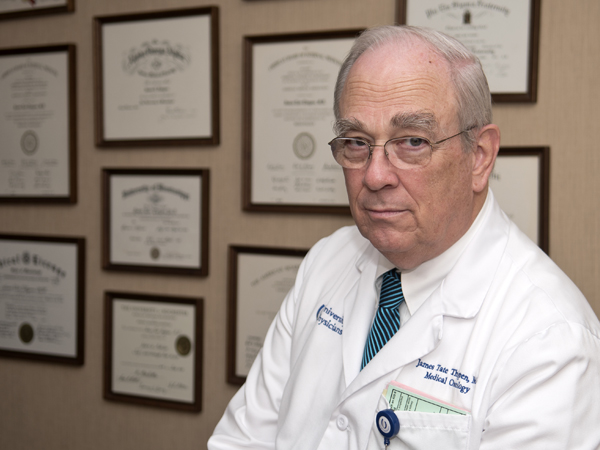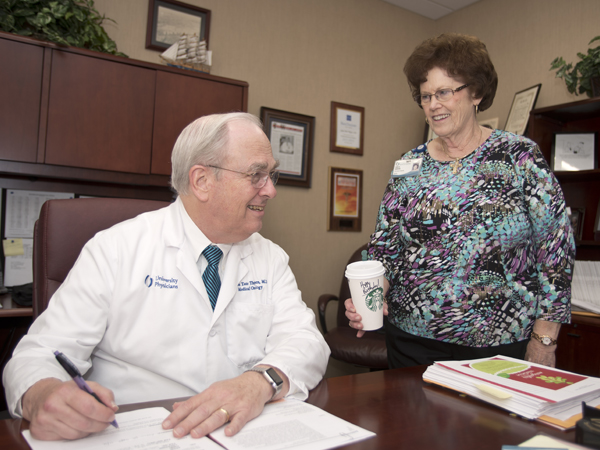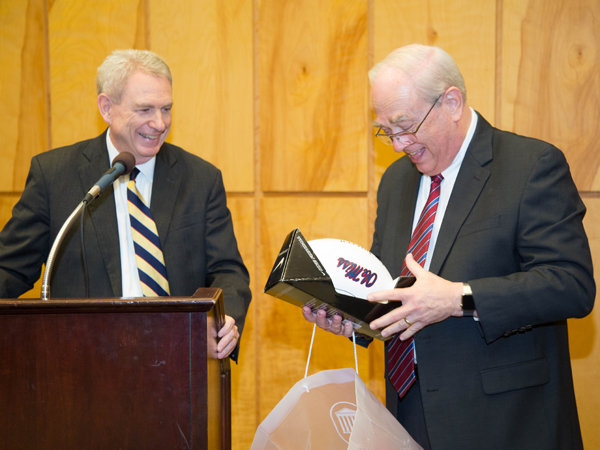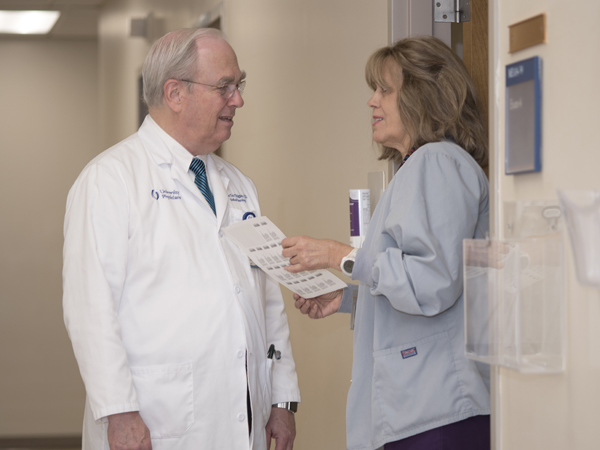Thigpen leaves immeasurable impact on cancer patients, research

Dr. James T. “Tate” Thigpen has helped UMMC's cancer programs grow from a seedling in 1973 to an orchard in 2016, the year he chose for retirement.
But John Blessing calls the Picayune native's retirement as professor and director of the Division of Hematology/Oncology a misnomer.
“He is more in demand as a speaker than anybody I know,” said Blessing, executive director of the NRG Oncology Statistical and Data Center at Roswell Park Cancer Institute in Buffalo, New York
“I doubt that will go away.”
Neither will his legacy: Throughout his 43-year career, Thigpen has improved the lives of cancer patients across Mississippi.
Much of the Picayune native's work has been fueled on two cups per day of Starbucks coffee, always cinnamon dolce latte. Bonita Herring, supervisor of business operations for the division, who also announced her retirement, admits she brings him one most mornings on her way to work.

The joke even extended to the class he teaches at First Baptist Church. His son, Dr. Calvin Thigpen, said the class bought him one share of Starbucks stock and had it framed with a note that now he can walk in like he owns the place.
“Now, when he goes for coffee, he says he's just checking on his business,” Calvin Thigpen said.
His attention to business has stimulated growth in cancer services inside the Medical Center and beyond. When he came on staff, UMMC had five infusion therapy chairs for cancer outpatient treatment. Today it has 35.
The dawn of Thigpen's impact was in 1973, when he joined Dr. Francis Morrison, the person he credits with starting UMMC's cancer program.
“We were a very small operation until the 1990s when we started to expand our faculty,” Thigpen said.
Another mentor, Dr. Richard C. Boronow, came when Thigpen was a fourth-year medical student. “He got me involved in the GOG (Gynecologic Oncology Group), Thigpen said.
“Boronow dragged me kicking and screaming to the GOG in 1975.”
Once there, Thigpen found himself, by default, heading the Protocol Committee, the group that decides which research studies will be funded. He was 32.
At a “far too young age,” he said, he was charged with finding promising studies and clinical trials. Through a plan devised by him and his committee, the GOG essentially established the current standards of care in gynecologic oncology.
In Mississippi, Thigpen also was focused on training the people who could deliver cancer therapies. “We've gone from a situation where there was very little cancer care to a situation where most people can get very good cancer care anywhere in the state,” he said.
Dr. Dan Jones, interim chair of the Department of Medicine and director of clinical and population sciences for the Mississippi Center for Obesity Research, praised his work at a recent retirement reception. Thigpen was instrumental in efforts to offer cancer clinical trials to patients, said Jones, He “paved the way” for others who now offer clinical trials in other areas.

Dr. David Morris, hematologist/oncologist at Hattiesburg Clinic and president of the Mississippi Society of Oncology, said he once saw the breadth of Thigpen's work acknowledged at an international gynecologic oncology conference in New York.
“A faculty member from Sloan Kettering pointed Tate out to his fellows and informed them, 'Dr. Thigpen is the most influential man in gynecologic oncology,'” Morris said.
For the past three years, Morris and the MSO have joined with UMMC to help fulfill another dream of Thigpen's: A conference at which Mississippi cancer caregivers can learn about the latest research presented at the American Society of Clinical Oncology annual meeting.
Is Thigpen proud of his accomplishments? “No, it should have been a lot more,” he said. “I am proud of the growing fellowship program that supports the state with well-trained oncologists taking care of patients.”
And, he said he's proud of work done by colleagues in the NCI-affiliated Gynecologic Oncology Group.
As head of the GOG Protocol Committee he led efforts to fund research and clinical trials. When the National Cancer Institute merged groups in 2014, he was named one of the deputy chairs of NRG Oncology, one of four adult cancer clinical trials groups funded by the NCI.
“I don't think anybody has had a bigger influence in gynecologic cancer research than he has in his leadership role and the way he could mobilize people around him to do it,” Blessing said.

Still, Thigpen's humor has become as important to his friends as his work ethic and character.
Blessing describes a constant competition for points between the two over anything: video games, online games, board games; and, if they're sick, who is sicker.
The competitiveness extends to his clinics, Calvin Thigpen said. “Most patients see this as a battle. He's a perfect fit for that. He's always liked seeing what he can do, especially against the odds.”
Thigpen brought hope to thousands of families facing a gynecologic cancer diagnosis, said Dr. Srinivasan Vijayakumar, chair of the Department of Radiation Oncology and Cancer Institute director.
“He's touched so many lives here, both patients and young doctors. That doesn't compare to the number of lives he and others in the GOG and NRG saved through the research they identified and funded.
“Even though we're losing him as director of Hematology/Oncology, his influence will long be felt in Mississippi.
“His contribution to reducing deaths from cancer is incalculable. We owe him a great debt for that work and the passion that drove it.”


